Breaking down barriers in the fight against cyber-crime
- Published
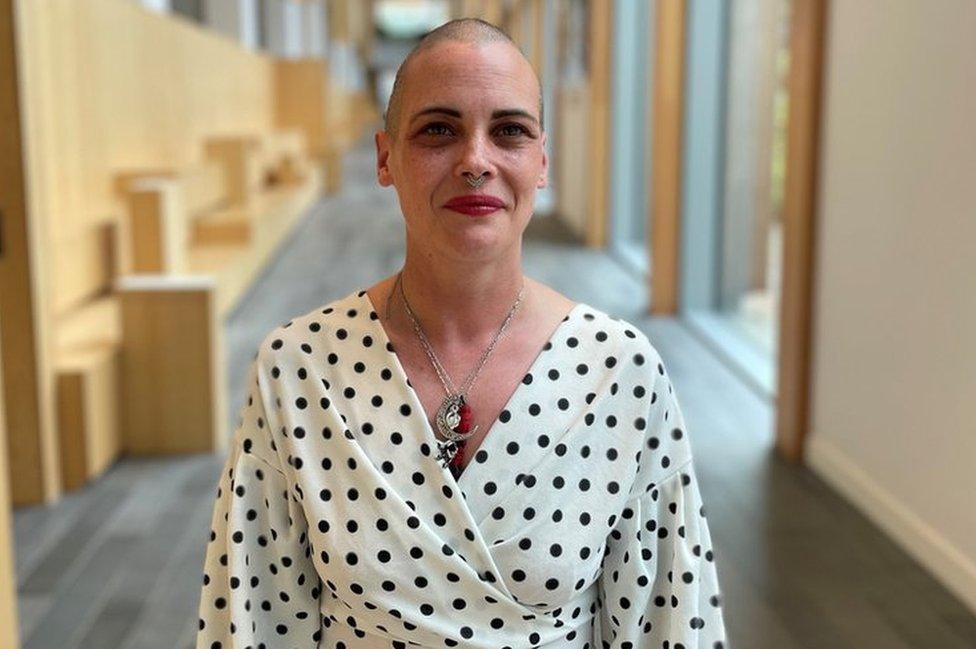
Louise Meney said the course had increased her confidence after her job search was hit hard by Covid
Louise Meney was 12 when she discovered hacking while browsing the internet with her first computer.
More than two decades later she now dreams of making a living from it thanks to a pioneering new course designed to break down gender barriers.
Ms Meney is one of 77 women who signed up for the free programme, which is based at Glasgow Caledonian University (GCU).
And by the end of the year she will be able to pursue her dream of a career in in the booming cyber-security industry.
As well as meeting the soaring demand for experts, the qualification is also designed to challenge the make-up of the tech industry, where less than a quarter of professionals are female.
Recruits for the Women Do Cyber programme - a partnership between Cisco, Scottish Women in Technology (SWiT) and GCU - include students who are currently unemployed.
The initiative has also been supported by Police Scotland and the Scottish government.
Ms Meney was at secondary school when she started hacking after discovering a how-to website.
She told BBC Scotland: "It is something I have always enjoyed doing but not from a bad perspective.
"I think people hear the word hacker and the immediately think 'bad guy who is going to steal my bank details'.
"There is a field of hacking that is ethical.
"We are the people who work to stop people from penetrating systems and getting access to information that they should not have."
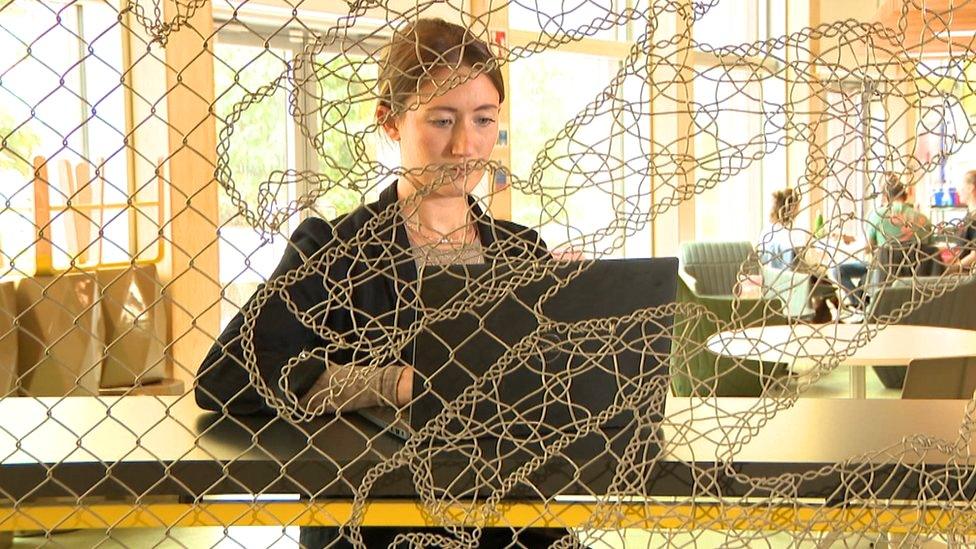
Almost 80 students have signed up for the seven-month course, which is based at Glasgow Caledonian University
Ms Meney, 36, aspires to work for a purple team which involves a mix of offensive and defensive security.
One area she hopes to specialise in is bug bounties, which are paid out if hackers can identify weaknesses in IT systems.
She described the course as the new challenge she had been looking for.
"I have always been a bit geeky," she said.
"I was working as a software engineer for the last few years but I was not enjoying it any more."
Ms Meney found out about the new opportunity as she was still in touch with lecturers from the applied psychology degree she completed at GCU in 2017.
She said: "When I was speaking to them it just seemed like the perfect course for me with my interests and background."
'It has given me a lot of hope'
Ms Meney, who lives in Milton, Glasgow, has been out of work since she contracted Covid early in the pandemic so she did not hesitate to register for the course.
The former software engineer said: "I am unable to predict how my body will react on a certain day.
"If my long Covid symptoms were playing up then I would not be able to perform on a technical test."
She said she was open and honest in her application about her ongoing issues and praised the support she had received.
She added: "It has given me a lot of hope and exposed me to people I would not have met otherwise."
The course, which started last month, is aimed at women aged 18 and above, including those who are currently unemployed or underemployed.
No previous knowledge or experience in technology or maths is required to become a Cisco Certified CyberOps Associate, which is industry recognised qualification.
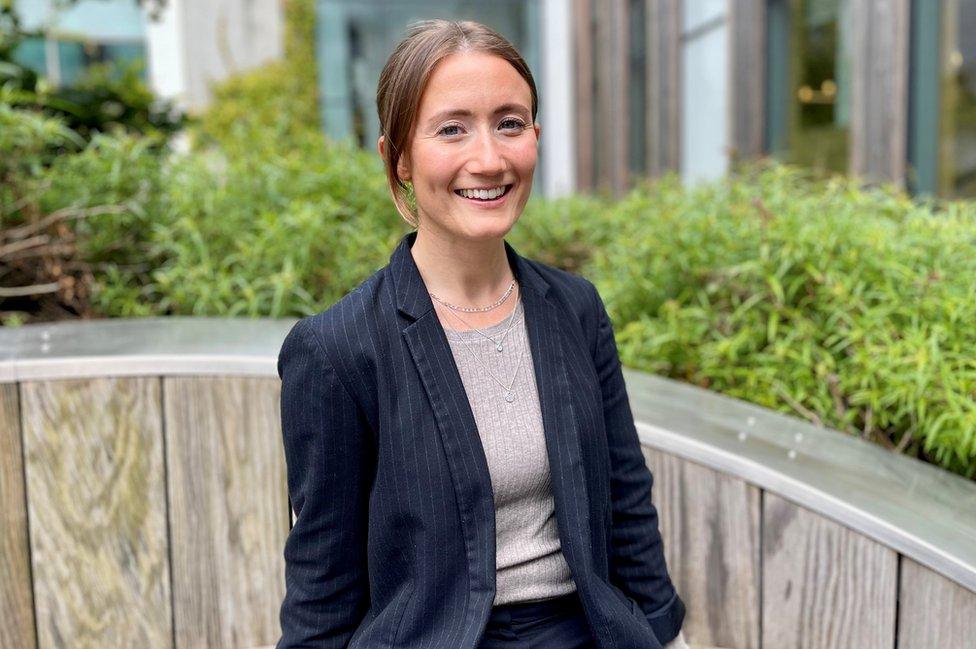
Louise Morran currently works in the energy industry
Louise Morran is a defuelling project manager at the Hunterston B nuclear power plant in North Ayrshire.
It was shut down for the final time in January after generating electricity for 46 years.
The site, owned by EDF Energy, is undergoing a three-year process of defuelling with the spent nuclear fuel sent to Sellafield for reprocessing.
Ms Morran, from Kilmarnock, said her employers had been supportive of her enrolling on the course, given the vulnerabilities of the energy sector to a cyber-attack.
Her course work currently takes up one day during the week and a day at the weekend.
She added: "It is good doing my full-time job at the same time because I can take what I am learning outwith work and then see how it could be applied to my day-to-day job.
"Cyber-security is only going to get more and more important."
'Amazing women'
Ms Morran, 30, highlighted the shift to home working and a massive increase in internet use during the Covid lockdowns as potential weak spots which could be exploited by criminals.
She has been familiar with gender gaps since her early student days when she was one of just four women on her electrical and mechanical engineering course at the University of Strathclyde.
She said: "It was quite obvious from the start but I have noticed more recently through my work that more of the apprentices coming into the energy industry are female."
There are no such issues on the GCU course and Ms Morran described the number of women involved as "amazing".
Asked if she had a message for those considering it, she replied: "Go for it. Stop doubting yourself."

What is cyber-crime?

The pandemic sparked a huge rise in malicious phishing emails
Cyber-crime is a global threat and is one of the biggest challenges facing law enforcement.
Lone hackers and gangs use sophisticated scams to target individuals, businesses and essential services.
More than 400 cyber-attacks were reported in Scotland in 2020/21 and notable recent victims include the Scottish Environment Protection Agency (Sepa) and the charity SAMH.
The UK's National Crime Agency, external said cyber-criminals sought to exploit human or security vulnerabilities in order to steal passwords, data or money directly.
The most common threats include:
Hacking - including of social media and email passwords
Phishing - bogus emails asking for security information and personal details
Malicious software - including ransomware through which criminals hijack files and hold them to ransom
Distributed denial of service (DDOS) attacks against websites - often accompanied by extortion
The NCA said most cyber-attacks could be prevented by taking these basic security steps:
Choose strong passwords and don't reuse them for multiple logins
Install security software such as anti-virus and two-factor authentication. This kind of software is often available for free.
Keep all security software and operating systems updated (this can be set to update automatically)
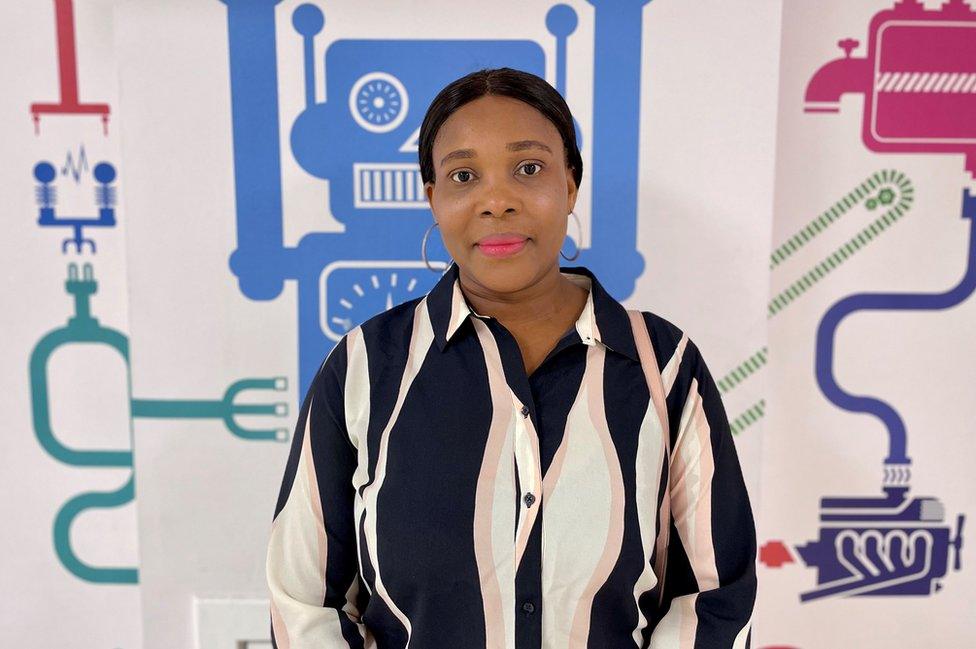
Chioma Uzoamaka has three computing degrees and is now hoping to work in cyber-security
Chioma Uzoamaka hopes a career in cyber-crime will allow her to balance her work and busy family life.
The former business analyst has four children aged between seven and 10.
Ms Uzoamaka, 41, previously worked in network security and is enjoying the new course.
She said: "It is a good start for me to help fight crime and I hope it will encourage more women to work in cyber-security."
Course mentor Ashley Beck said the threat was incredibly difficult to manage as so many more people were now online.
The former detective added that law enforcement needed support to keep up with a complex and ever-growing landscape.
Ms Beck, who is now a senior law enforcement consultant, added: "Everybody thinks it is just big companies that get targeted but actually you are talking about people downloading applications that actually give organised criminal groups access to everything that you click on on your device.
"It could be your banking app or anything like that."
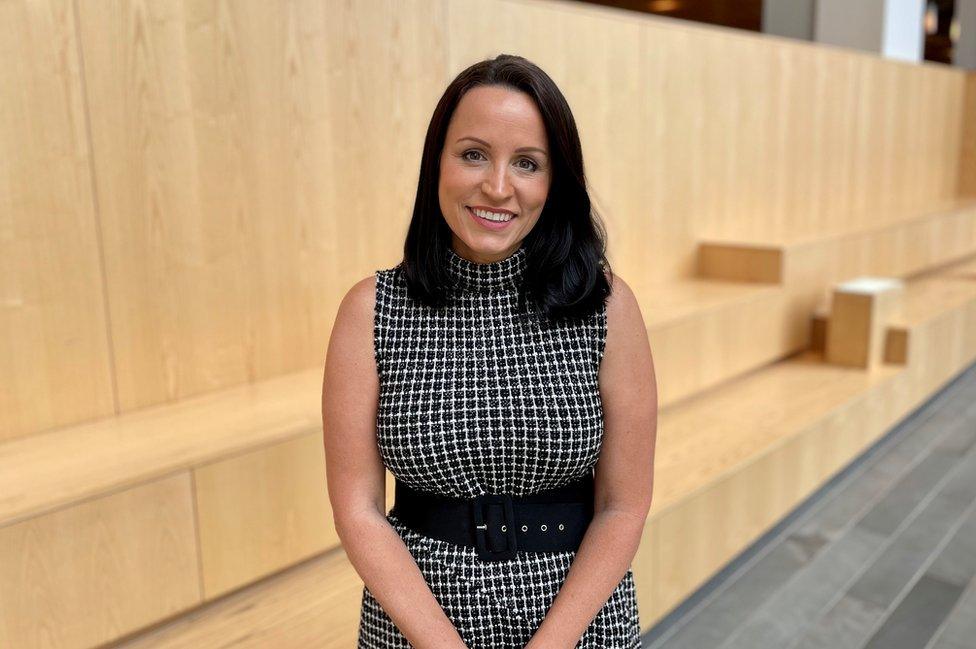
Former detective Ashley Beck is a mentor on the course
Silka Patel, founder of SWiT, believes the course will have a positive impact as only 23% of Scotland's tech workforce is currently female.
She added: "Diversity should not be an afterthought, it should be built in from the beginning.
"This course helps women feel like they belong in the sector."
Dr Salma Mohamed, lecturer in cyber-security networks at GCU, is confident the programme will help to change perceptions of hacking.
She said: "The first image you have is this person who is male with a hood just sitting at a computer.
"We just need to make this image disappear and prove that there is this opportunity that we can have a female that can do the job but, of course, ethical hacking."
Dr Mohamed said cyber-crime increased during the pandemic and revealed she was targeted by a bogus caller who said he was from HMRC.
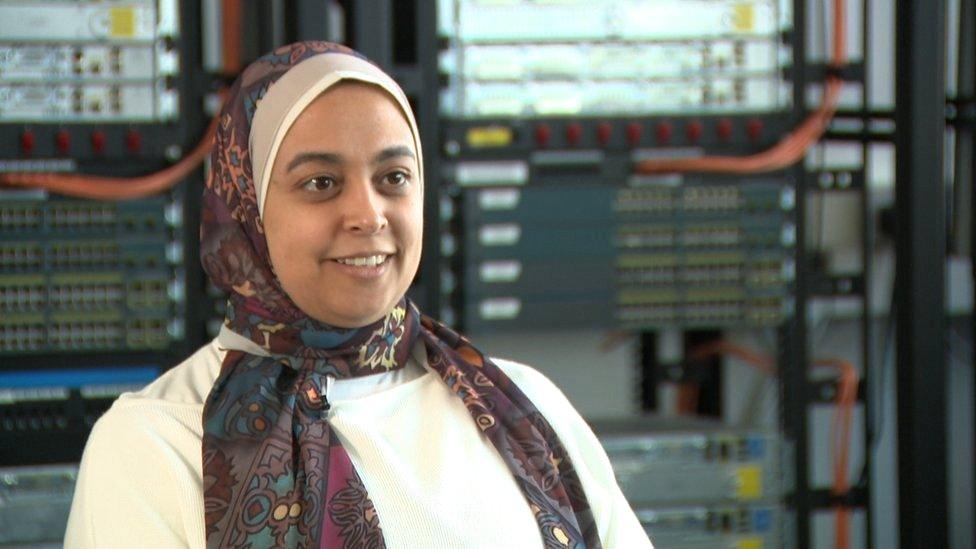
Dr Salma Mohamed, lecturer in cyber-security networks at GCU, hopes the course will attract more women to work in the tech sector
Police Scotland has described the fight against cyber-crime as a national priority.
Chief Supt Faroque Hussain said: "It poses a real and substantial threat to our communities and businesses and having a legacy in this academic course to upskill women on the subject is a meaningful reflection of the preventative measures we are taking.
"The women on this programme will learn about the real and present danger posed by the online arena.
"Having their knowledge underpinned with academic rigour will hopefully gain them entry into digital-security-related employment where they can make a direct contribution to the country's cyber-capability."
The senior officer also donated laptops to students who didn't have access to one.
Chief Supt Hussain added: "With cyber-crime reports almost doubling in a year with an increase of 95%, we need to take action now to protect people from digital harm and crimes in the virtual world."
- Published15 June 2022

- Published27 October 2021
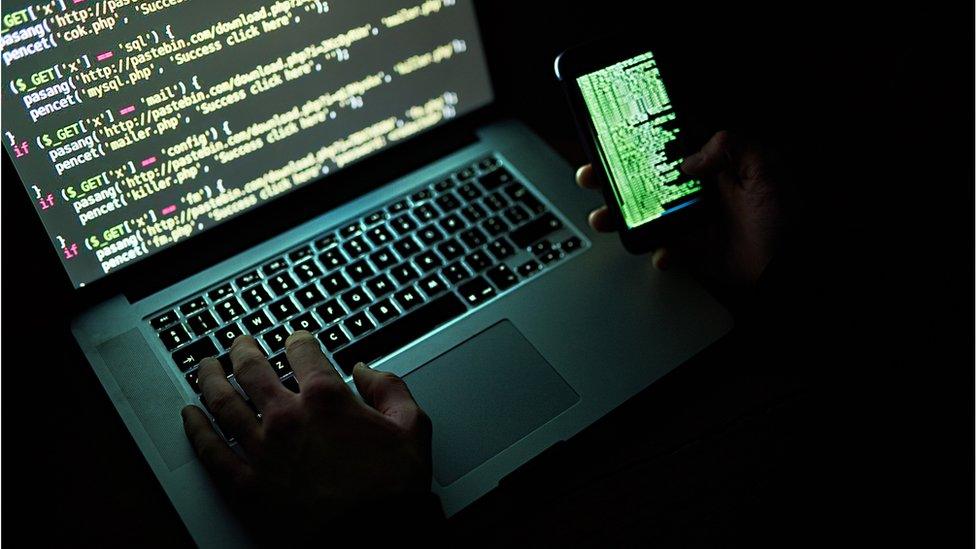
- Published21 March 2022
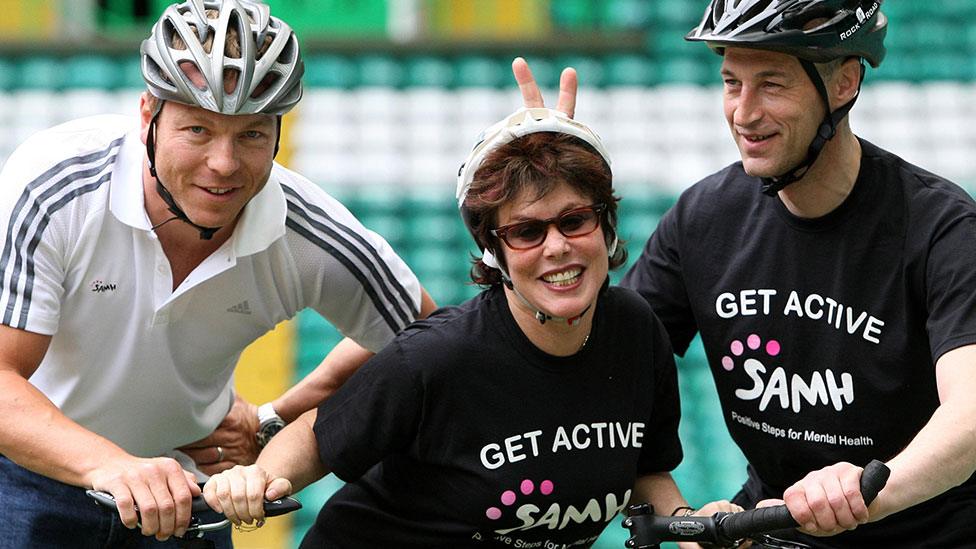
- Published24 December 2020

- Published27 September 2020
